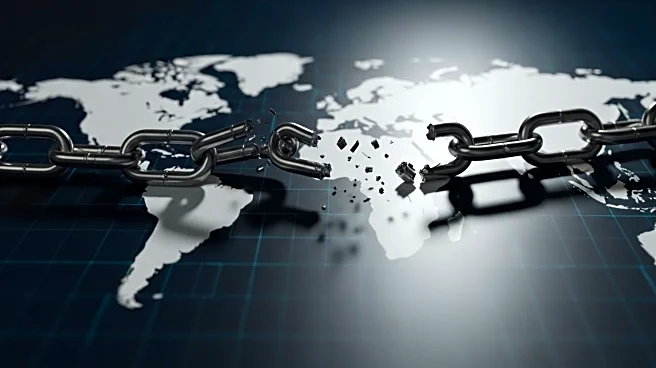What is the story about?
What's Happening?
The internet went down across much of Afghanistan on Monday, as concerns mounted that hard-line leaders within the ruling Taliban might be trying to cut off Afghans from each other and the world. The country is now in the midst of a total internet blackout, with networks disconnected in a stepwise manner, according to a statement from NetBlocks, a watchdog group that monitors internet outages. The blackout has affected telephone services and disrupted broadcasts from Afghan television channels. The Taliban have ruled Afghanistan under their strict interpretation of Islamic religious law since the group's return to power in Kabul in 2021.
Why It's Important?
The internet blackout in Afghanistan has significant implications for the country's communication infrastructure and access to information. It disrupts the ability of citizens to connect with the outside world, affecting education, business, and social interactions. The blackout is likely to exacerbate the humanitarian crisis in Afghanistan, as it limits access to vital services and information. The move also raises concerns about the Taliban's ongoing restrictions on human rights, particularly the rights of women and girls, journalists, and public dissent. The shutdown could have severe consequences for Afghanistan's economy and social fabric, as it hinders the ability of citizens to engage in online activities and access global information.
What's Next?
The Taliban has indicated that the telecom shutdown will last until further notice, leaving the duration of the blackout uncertain. The international community may respond with increased scrutiny and pressure on the Taliban to restore internet access and uphold human rights. Afghan citizens and businesses will need to adapt to the new reality of limited connectivity, potentially seeking alternative means of communication and information access. The situation may also prompt discussions on the role of technology and internet access in promoting human rights and development in Afghanistan.
Beyond the Headlines
The internet blackout in Afghanistan highlights the broader issue of digital rights and access to information in conflict zones. It underscores the challenges faced by citizens living under regimes that restrict freedom of expression and access to technology. The situation raises ethical questions about the balance between security measures and individual rights, as well as the role of international organizations in advocating for digital rights. The long-term implications of the blackout could include increased efforts to develop alternative communication networks and technologies that bypass government restrictions. The event also serves as a reminder of the importance of global advocacy for internet freedom and the protection of human rights in the digital age.

















